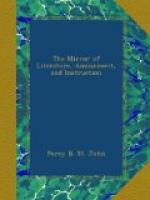The Gipsies furnished a number of singers about this time. The laws and prejudices of society concurred in denouncing this race; but, nevertheless, the best received ballad-singers of their time were of this bronzed tribe.
In the reigns of James the First and his successor, the taste of the people for nature and simplicity kept up the profession of ballad-singing. We are to look upon ballad-singers from this time as a corporation. Custom had established yearly festivals for them in the classic regions of St. Giles’s, which were frequented by the wits of the day—Swift, Gay, Bolingbroke, Steele, &c. From these high followers of the muses, yearly contingents of ballads were expected. Swift contracted for the humourous songs: Gay who had, as Goldsmith says, “a happy strain of ballad-thinking,” was set down for the pathetic ones; and those of a miscellaneous character were divided amongst a number of amateur bards. No importunities, even of his friends, could induce Pope to attend any of these assemblies. He was prevailed on to write an epitaph for a young creature whom he had seen, and who was known by the name of Clarinda: favoured by the great, if she had not been attached to the life of a ballad-singer, she might, with her accomplishments, have risen to distinction and fortune.
Gay and Swift had naturally a relish for low society, and were hailed by the fraternity as the most precious sources of profit. Amongst other songs which Swift sent into the world through the medium of ballad-singers, was a severe satire upon the Duke of Marlborough, beginning “Our Johnny is come from the wars:” it drew much attention, and excited the strongest resentment against the author in the breast of the Duchess, who remained implacable until the publication of Gulliver, when she offered her friendship to Swift, through his friend Gay.
There was a young creature among the ballad-singers known to the world by no other title than Clara, who drew much attention at this time by the sweetness and pathos of her tones. She was the original singer of “Black-eyed Susan,” and one or two songs which were afterwards introduced into the “Beggar’s Opera;” but her recommendation to particular notice was the circumstance of her being for many years the object of Bolingbroke’s enthusiastic affection. The poor girl strayed for some time, during which his Lordship had not seen her: it was after this interval, that, meeting her, he addressed to her the tender lines, beginning,
“Dear, thoughtless Clara, to my
verse attend,
Believe for once the lover and the friend,”
And concluding thus:
“To virtue thus, and to thyself
restored,
By all admired, by one alone adored:
Be to thy Harry ever kind and true,
And live for him who more than died for
you.”
A series of calamities totally ruined her vocal powers, and she afterwards subsisted by the sale of oranges at the Court of Requests.




